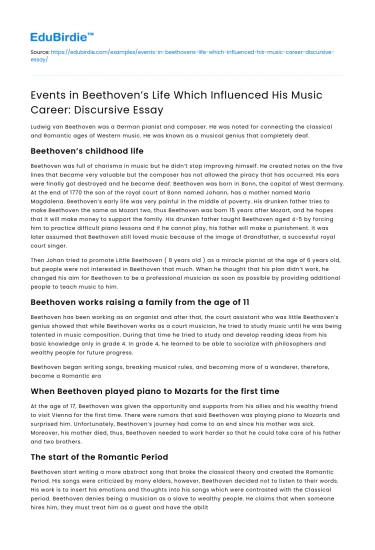Introduction
Ludwig van Beethoven's name resonates as one of the most influential figures in Western music history. Born in Bonn in 1770, Beethoven's life was marked by personal struggle and artistic triumph, laying the groundwork for the transition from the Classical to the Romantic era. His profound impact on music is not only due to his innovative compositions but also his ability to transcend the challenges posed by his deteriorating hearing. As we delve into Beethoven's life events and music career, we uncover a narrative that is as compelling as it is inspirational. Through examining his early years, the struggles he faced, and his remarkable achievements, we gain insight into how Beethoven redefined the landscape of Western music. This essay explores the pivotal moments of Beethoven's life and career, providing a comprehensive understanding of his enduring legacy.
Early Life and Musical Foundation
Beethoven's early life was pivotal in shaping his future as a musical genius. Born into a family of musicians, his father, Johann van Beethoven, recognized Ludwig's prodigious talent early on and subjected him to rigorous training. This foundation was crucial, as it exposed Beethoven to the works of masters like Mozart and Haydn, whose influences are evident in his early compositions. By the age of seven, Beethoven was performing publicly, and at 12, he published his first work. Despite the challenges of an abusive father and the financial instability of his family, Beethoven's commitment to music remained unshaken. His move to Vienna in 1792 marked a significant turning point, where he studied under Joseph Haydn and absorbed the rich musical culture of the city. This period was essential for Beethoven's development, allowing him to refine his skills and gain exposure to a vibrant artistic community. However, it was not without its challenges. Beethoven's early experiences laid a resilient foundation, equipping him with the skills and determination to navigate the complexities of a burgeoning music career.
Save your time!
We can take care of your essay
- Proper editing and formatting
- Free revision, title page, and bibliography
- Flexible prices and money-back guarantee
Overcoming Adversity and Achievements
Beethoven's musical journey was fraught with personal and professional adversity, yet these challenges only fueled his creative output. One of the most significant obstacles was his progressive hearing loss, which began in his late twenties. This condition, which could have ended a lesser artist's career, instead became a catalyst for Beethoven's most celebrated works. The "Heiligenstadt Testament," a letter he wrote to his brothers in 1802, reveals his profound despair over his condition. Yet, it also marks a turning point, as he resolved to continue composing despite his affliction. This period led to the creation of some of his most iconic compositions, such as the "Symphony No. 3 in E-flat major, Op. 55" (Eroica), which broke new ground with its emotional depth and complexity. His ability to communicate profound emotion through music despite his deafness is a testament to his resilience and genius. Beethoven's achievements during this period not only reflect his mastery of musical form but also demonstrate how adversity can be transformed into artistic triumph.
Legacy and Influence on Western Music
Beethoven's influence on Western music extends far beyond his lifetime, shaping the trajectory of musical evolution. His compositions expanded the scope of symphonic and chamber music, introducing innovations in form, structure, and emotional expression. The "Symphony No. 9 in D minor, Op. 125," with its choral finale, is a prime example of Beethoven's revolutionary approach. This work not only stretched the boundaries of symphonic form but also embodied the ideals of unity and brotherhood, resonating with audiences worldwide. Moreover, Beethoven's advocacy for the artist's role as an autonomous creator rather than a servant to the aristocracy paved the way for future generations of composers. By championing the concept of music as a personal and emotional expression, Beethoven set the stage for the Romantic era. His legacy is further evidenced by the countless musicians and composers who have drawn inspiration from his work, including Brahms, Wagner, and Mahler. Beethoven's enduring impact underscores his position as a pivotal figure in the history of Western music.
Conclusion
In conclusion, Ludwig van Beethoven's life and career encompass a journey of extraordinary artistic achievement and personal resilience. From his early beginnings in Bonn to his transformative years in Vienna, Beethoven's dedication to his craft and his ability to transcend adversity have left an indelible mark on the world of music. His compositions, characterized by emotional depth and innovative form, continue to inspire and influence musicians across generations. Beethoven's legacy is a testament to the power of the human spirit and the enduring impact of art. As we reflect on his contributions, it is clear that Beethoven not only redefined the boundaries of music in his time but also laid the groundwork for the future of Western music. His life story serves as a powerful reminder of the potential for creativity and perseverance to overcome even the most formidable challenges.






 Stuck on your essay?
Stuck on your essay?

